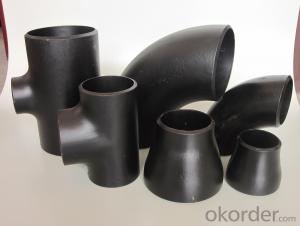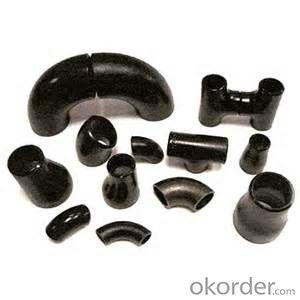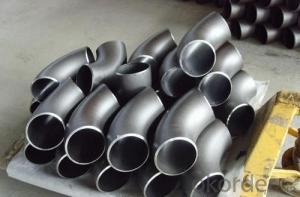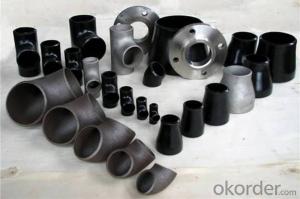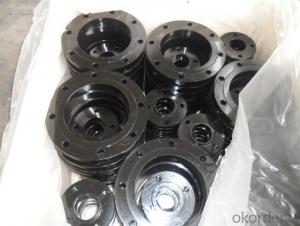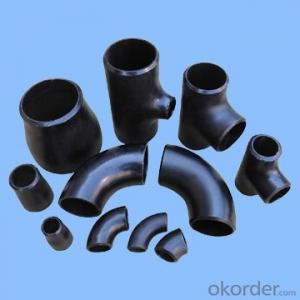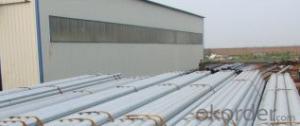6'' CNBM carbon steel pipe fittings ISO/ BS EN/DIN/ API
- Loading Port:
- Tianjin
- Payment Terms:
- TT OR LC
- Min Order Qty:
- 5 m.t
- Supply Capability:
- 300 m.t/month
OKorder Service Pledge
OKorder Financial Service
You Might Also Like
Products Detailed Description
Products | pipe fittings elbows, bends,tees, reducers caps |
Size | 1/2" - 48" |
Wall thickness | Sch5-Sch160 XXS |
Standard | ANSI, ASME API5L, OCT, DIN and JIS, etc. |
we can also produce according to drawing and standards provided by customers. | |
Material | Carbon steel, alloy steel and stainless steel. |
We can produce according to materials appointed by consumers. | |
Packaging | Plywood Cases,plywood pallet, plastic bag or as customers requirement |
Surface Treatment | Shot blasted, rust-proof black oil |
Delivery Time | 10-60 days |
Quality | First grade |
Others | 1.Special design available according to your drawing. |
2.anti-corrosion and high-temperature resistant with black painting | |
3. All the production process are made under the ISO9001:2000 strictly. | |
4. A conformity rate of ex-factory inspection of products. |
Specifications
Ansi B16.9 WPB carbon steel pipe fitting elbow tee reducer
Size:Seamless 1/2"-24" Welded 1/2"-48"
ANSI B16.9 WPB carbon steel pipe fitting elbow tee reducer
1.Size: Seamless 1/2"-24" Welded 1/2"-48"
2. WT: SGP, STD, SCH40, SCH80, SCH100,SCH120,SCH160,XS,XXS
3. Material:
stainless steel Grade: 201,304,304L,316,316L,317,317L,904L,and etc
carbon steel Grade: WPB,GRB, Q235,16MN
Alloy steel: st35.8,st52,wp11,wp22,wp12 wp l6
4. Standard: ASTM/AISI/DIN/JIS
5. Type: Concentric and eccentric
6. Surface treatment: Transparent oil, rust-proof black oil
7. Applications range: Applications range: for use in the petroleum, smelting, foodstuff, power, papermaking, chemical, medical equipment,aviation, boiler heat exchanger, and other fields
8. Packing: wooden case or as per customers' requirement
- Q: Can steel pipes be used for underground stormwater drainage?
- Yes, steel pipes can be used for underground stormwater drainage. Steel pipes are commonly used in underground drainage systems due to their durability, strength, and resistance to corrosion. They can effectively manage the flow of stormwater and provide long-lasting solutions for underground drainage needs.
- Q: Can steel pipes be recycled?
- Yes, steel pipes can be recycled. Steel is a highly recyclable material and can be used to create new steel products, including pipes, through processes like melting and reshaping. This helps to conserve natural resources, reduce energy consumption, and minimize waste.
- Q: What are the safety precautions to follow while working with steel pipes?
- When working with steel pipes, it is important to follow certain safety precautions to ensure a safe working environment. Here are some key safety measures to consider: 1. Personal Protective Equipment (PPE): Always wear appropriate PPE, including safety goggles, gloves, steel-toed boots, and a hard hat. This will protect you from potential hazards such as falling objects, sharp edges, or flying particles. 2. Use proper lifting techniques: Steel pipes can be heavy and awkward to handle. Use proper lifting techniques, such as bending your knees and using your legs to lift, to avoid straining your back or causing musculoskeletal injuries. 3. Secure the work area: Clear the work area of any clutter or obstacles that could pose a tripping hazard. Ensure that the pipes are properly stored and secured to prevent them from rolling or falling. 4. Be cautious of sharp edges: Steel pipes often have sharp edges, which can cause cuts or punctures. Handle them with care and consider using protective covers or gloves to avoid injuries. 5. Use appropriate tools: Utilize the correct tools and equipment for cutting, welding, or manipulating steel pipes. Follow manufacturer instructions and guidelines to ensure safe usage. 6. Avoid working in confined spaces: Working in confined spaces poses serious risks. If it is necessary to work in such an area, ensure proper ventilation and follow confined space entry protocols to prevent asphyxiation or other hazards. 7. Follow proper welding procedures: If welding is involved, follow proper welding procedures and ensure proper ventilation in the workspace. Use fire-resistant blankets or screens to protect nearby combustible materials. 8. Be aware of hot surfaces: Steel pipes can become hot during welding or other processes. Use appropriate insulation or heat-resistant gloves to protect yourself from burns or heat-related injuries. 9. Establish communication: Establish clear communication channels with colleagues when working with steel pipes, especially when lifting or moving heavy objects. Use hand signals or verbal communication to ensure everyone is on the same page and to prevent accidents. 10. Regularly inspect tools and equipment: Before starting any task, inspect tools, equipment, and scaffolding for any damage or defects. Report and replace any faulty equipment to prevent accidents. Remember, safety is paramount when working with steel pipes. By following these precautions and using common sense, you can ensure a safe working environment for yourself and your colleagues.
- Q: What are the different types of couplings used with steel pipes?
- There are several types of couplings commonly used with steel pipes, including threaded couplings, slip-on couplings, welding couplings, and flanged couplings. Each type of coupling has its own specific method of connection and is chosen based on the requirements of the application and the pipe system.
- Q: Seamless steel tube 89X4 meters, how heavy?
- The theoretical weight calculation formula of plain carbon steel and alloy steel seamless pipe:W=0.02466 (D-S) S, the density of steel fand 7.85kg/dmNote: weight per meter kg/m= (outer diameter wall thickness) * wall thickness *0.02466 units, mm: mmFor example, the seamless steel pipe with a diameter of 89*4 weight per meter:(89-4) *4*0.02466=8.384 kg / M.
- Q: How are steel pipes used in the agriculture industry?
- Steel pipes are used in various ways within the agriculture industry. They are commonly used for irrigation systems, allowing water to be efficiently transported to crops. Steel pipes are also used for drainage systems, ensuring excess water is properly removed from fields. Additionally, steel pipes are used for building structures such as barns, fences, and animal enclosures, providing durability and strength.
- Q: What are the different types of steel pipe bends?
- There are three main types of steel pipe bends: 90-degree bends, 45-degree bends, and 180-degree bends. These bends are commonly used in piping systems to redirect the flow of fluids or gases in a desired direction.
- Q: Can steel pipes be used for irrigation pumps?
- Yes, steel pipes can be used for irrigation pumps. Steel pipes are commonly used in irrigation systems due to their durability, strength, and resistance to corrosion. They can efficiently transport water from the pump to the irrigation fields, ensuring a reliable and long-lasting solution for irrigation needs.
- Q: What are low-pressure carbon steel tubes?
- Pipe fittingsA pipe fitting is a piece of pipe that is connected to a pipe. According to the connection method can be divided into socket type pipe fittings, threaded fittings, flange fittings and welding pipe four categories. Multipurpose; made of the same material as pipes. Elbow (elbow), flange, three pipe and four pipe (crosshead) and reducer (reducer) etc.. Elbow for pipeline corner; flange for the pipe and pipe interconnected parts, connected to the pipe end, three pipe for three pipe collection; four pipe for four tubes together place; for two pipes of different diameters connected to different diameter pipe.
- Q: How are steel pipes used in the manufacturing of pulp and paper mills?
- Steel pipes are commonly used in the manufacturing of pulp and paper mills for various purposes. They are primarily utilized for transporting water, chemicals, and steam throughout the mill's processes. Steel pipes are also employed for structural support, such as in the construction of storage tanks, conveyors, and equipment frames. Additionally, they are used for providing compressed air, ensuring efficient operation of machinery and processes. Overall, steel pipes play a crucial role in facilitating the smooth functioning and efficient production of pulp and paper mills.
Send your message to us
6'' CNBM carbon steel pipe fittings ISO/ BS EN/DIN/ API
- Loading Port:
- Tianjin
- Payment Terms:
- TT OR LC
- Min Order Qty:
- 5 m.t
- Supply Capability:
- 300 m.t/month
OKorder Service Pledge
OKorder Financial Service
Similar products
Hot products
Hot Searches
Related keywords
